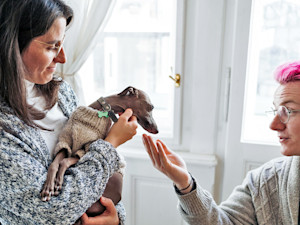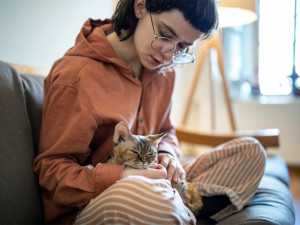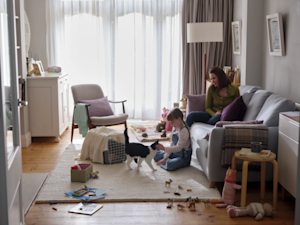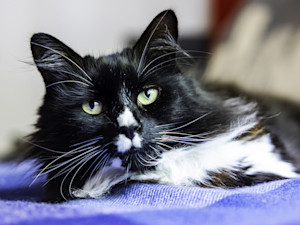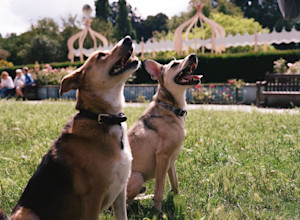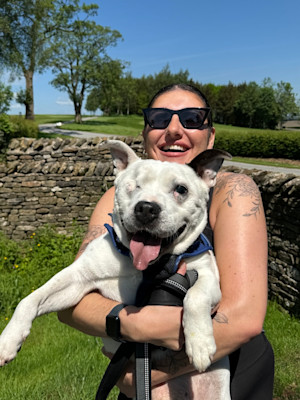This Irresponsible Article in The Cut Makes Light of Abhorrent Animal Neglect
If your mental health is causing you to neglect your pet, find them immediate care while you get help
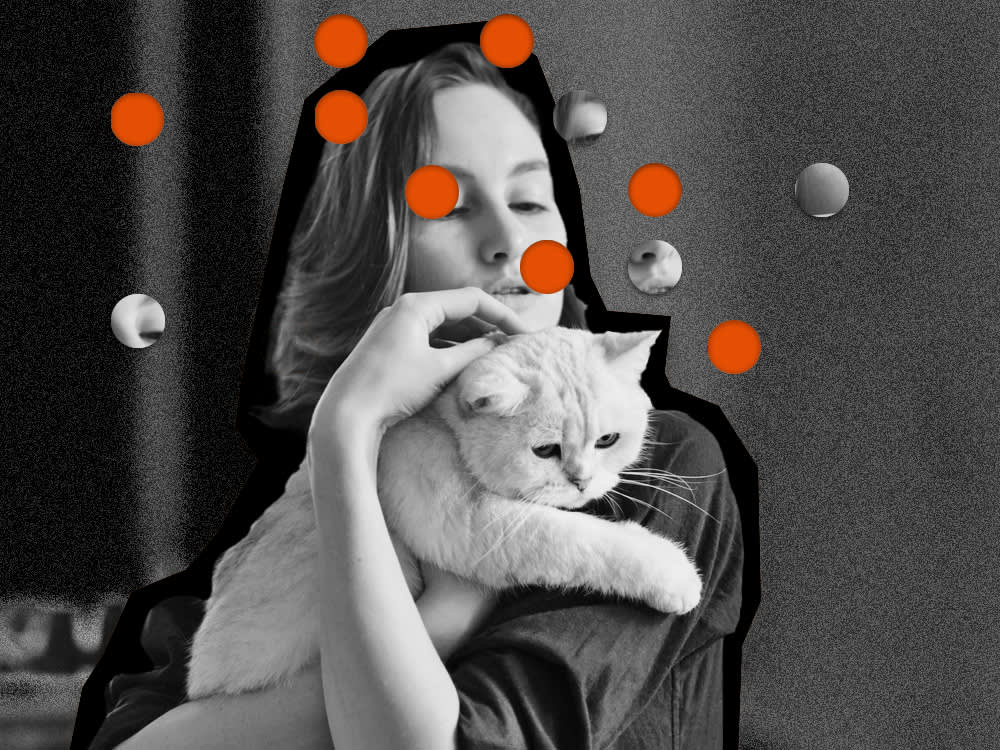
Share Article
When you adopt pets in your 20s (or even your 30s), you might not envision having kids – your pets are your kidsopens in a new tab. But hey, life happens, and suddenly you are in charge of cleaning baby vom off every surface in your home. And your pup or kitty feels that big life shift, too. The best thing you can do for your pet is to treat them with the care and respect they deserve during all this change. And if you can’t? You shouldn’t be their pet parent anymore – at least until you get the help you need.
A piece published in New York magazine’s The Cut on Monday has called attention to that very issue. The pieceopens in a new tab, which features the headline, ‘Why Did I Stop Loving My Cat When I Had a Baby?’ was published as part of a pet-parenthood/pet ethics packageopens in a new tab. In it, an anonymous writer, referred to in the article by the pseudonym ‘Audrey’, describes her experience of seriously neglecting her pet after giving birth to her child. There are less controversial pieces in the package, focused on topics like whether or not we can call ourselves ‘pet owners’, but they have seemingly taken a backseat as the internet rightly criticises this article.

Get (totally free) deals for food, treats, accessories, tech and way more pet parenting must-haves.
opens in a new tabThe extreme-sounding title and subhead – “My postpartum loathing of Lucky made me wonder whether I might be a late-onset psychopath” – may have had people expecting this piece to be a rumination on the very real struggles of postpartum depression (PPD) and the dark, intrusive thoughts that come with itopens in a new tab. Before you dig into this story, you think, Maybe the writer found her cat annoying or couldn’t cope with the overwhelming responsibilities of having both a baby and a pet. PPD and psychosis are serious conditions that can cause a parent immense guilt and shame, and they need to get help as soon as possible. But once you actually read this article, it’s clear that this is about a lot more than a new mother’s mental health.
The writer openly admits to severely mistreating her cat.
In this piece, Audrey describes what can only be defined as animal neglect. Not only is her treatment of her cat horrific, it’s equally upsetting that The Cut would publish something like this and allow this person to remain anonymous. In the piece, she admits, “If I treated a human the way I treated my cat, I would be in prison for years”. And yeah, she’s right.
Audrey says once she had her first baby, she developed a “postpartum loathing” of Lucky, and as a result, “basic needs went unmet”. She admits to forgetting to feed the cat, which caused Lucky to eat houseplants. Lucky then vomited up the plants (of course!opens in a new tab). Audrey didn’t scoop out the litter box, so the cat (obviously) pooed and peed on the floor. Audrey says Lucky “lost at least one tooth” and started to drink out of the toilet because she had no water in her bowl.
Audrey then admits that Lucky became depressed because of her maltreatment: “She skulked around the baby, slept in a sad cowering position, hesitated before approaching her food, eyed me with an uninterpretable but distinctly negative affect.” But Audrey says Lucky’s “condition coexisted with an unwillingness on [her] part to change anything about it”.
She then goes on to say that she hated her cat so much, that by the time the baby was two months old, she purposefully left windows open so that the cat “would take the initiative and leap out of one”. She adds that her family lives on the ground floor, so the cat wouldn’t actually die, but then flippantly follows that up with, “Call it voluntary catslaughter”.
Outside of telling her own story, Audrey spoke to parents/pet parents, including one dog parent who considered having her dog euthanised to avoid having to pay for their surgery. With the opinions of these other sources added, the article frames this kind of deep antipathy toward your pet as something all postpartum pet parents do. Of course, this isn’t true. But even if you do feel some distance from your pet after having a baby, you are still responsible for their care.
This goes beyond the issue of PPD.
One commenter on the The Cut’s site says, “Is this PPD? It isn’t normal. People are coming really hard for you in these comments, but if this is an accurate reflection of what is going on in your house and mind, please see a doctor.”
And yes, PPD is a condition that should be taken incredibly seriously. In December of last year, the World Health Organization reported that more than a third of womenopens in a new tab who have given birth experience lasting health problems, PPD included. The NHS reports that it affects one in ten womenopens in a new tab within a year of giving birth.
But, as the commenter points out, there is something else going on here. This kind of treatment of an animal cannot and should not be justified by the fact that Audrey clearly did not get the mental health support she needed as she was struggling. Many readers noted that The Cut did not appear to say whether they checked on Lucky’s well-being before publishing this article, leading to more concerns about her current condition. Yesterday, the publication posted opens in a new tabtheir editor’s note on X, stating that they “confirmed the welfare of the cat prior to publication”.
But that statement didn’t do much to quell criticism from X users (and why would it?). Readers continue to holdopens in a new tab The Cut accountable for publishing such a detailed depiction of mistreatment and neglect, with seemingly zero repercussions for the writer. Her confessions, and the blasé way she shares them, as if they’re a salacious secret, are difficult for any pet parent to read. However, while her particular behaviour is horrifying, the initial feelings of distance from her pet are not rare.
Dr Mandala, senior veterinary trainer at Animals Asiaopens in a new tab, says: “As a veterinarian and a devoted cat mom, I initially found it difficult to fully understand the experience described by the author. It seemed almost unbelievable to me, so I decided to look into it further. What I discovered is that this experience isn't as uncommon as I thought,” she says. “In fact, a study conducted in 2022opens in a new tab found that cat ownership can increase the chances of postpartum depression.”
The reasons are not clear, but it seems apparent that many new mums have similar stories of dealing with negative feelings toward their cats after having a baby. We’ve also written about the puppy bluesopens in a new tab, which new pet parents can experience when they bring home a new puppy and feel overwhelmed.
But this is something far beyond feeling distance or a flood of anxiety over a difficult adjustment. So, while Dr Mandala is sympathetic to the author’s experience of PPD, she is seriously concerned about this woman’s behaviour.
“From my perspective as a veterinarian and someone who deeply cares about animal welfare, I can say that a lack of proper care – such as not maintaining a clean litter box or providing adequate nutrition – can significantly affect a cat’s wellbeing,” she adds. “Issues like dental problemsopens in a new tab, where teeth begin to fall out, can also arise from neglect. While not all cats require a close bond with their guardian, it sounds like this particular cat sought comfort and connection, which may have made the sudden withdrawal of affection particularly distressing for her.”
Regardless of Audrey’s emotional situation, she has been capable of not only treating her cat in this way but taking the time to write about, edit, and justify it. This makes it harder to empathise with. Early in the piece, Audrey says that when she first got Lucky, she treated her with the utmost care – buying her ‘fancy’ food, supplements and high-quality toys. She groomed her frequently and set her up with a cashmere blanket by the space heater when it was cold. She also says she wasn’t even bothered when Lucky “shredded the furniture to smithereens”, a stark contrast to the treatment she describes now.
After giving birth, it appears that Audrey’s lavishing of care on the cat was both conditional and easily snatched away. Understandably, the cat struggles with this hot and cold treatment. Audrey realises she “did not have enough love for the cat, and [she] was irritable.” In other words, she is unable to care for her cat as she used to and needs to find another solution. Instead, she ends the piece saying that she hasn’t fallen back in love with Lucky but it could still happen. “I’ll shut the windows until then,” she says, her cat’s right to life somehow conditional on how “in love” with her she feels in the moment.
This has led commenters and those on social media to call for this cat to be re-homed and taken care ofopens in a new tab and are calling for the magazine to reveal her identity.opens in a new tab
“This cat appears to have been in a state of poor welfare, both mentally and physically. I sincerely hope that someone was able to step in and provide the necessary care. I also hope that this article encourages those who might be struggling to seek the help they need so that other cats – and their guardians – don’t have to suffer through a similar situation,” Dr Mandala says.
A neglected pet needs kind and compassionate care –immediately.
So: what should you do if you start to feel resentment toward your pet? If the feeling is temporary, as it may be if you have PPD, you can find someone to take care of them in the interim if they aren’t safe with you. If you believe you may harm or neglect your pet because of the state of your mental health, you can temporarily place them with someone who won’t while you seek care or have someone you trust help you get the care you need.
If the problem persists, Dr Mandala says, “the responsible thing to do when you can no longer care for your pet adequately is to look into rehoming them so that their needs can be fully met”. There are always prospective new parents and other facilities and individuals who are willing to look after a cat if they are not safe at home. There is never any excuse for neglect or mistreatment of your pet.
Again, it’s normal for some pet parents to have less time for their pet or to feel distance from them after the birth of a baby. Your family structure has to reorganise, and everyone within it may have to find new roles. If you truly cannot care for your pet anymore, you need to do the responsible thing and find a place where they can live their best, healthiest life.
The behaviour described in this article is distressing to many, because it is unequivocally neglect. A pet is different from a baby, but animals are vulnerable, and domesticated ones rely on us for their care. They may not be able to speak, but they can feel. They can feel fear and hunger and shame and pain.
It is our responsibility to protect them from those feelings. They should never, ever be collateral damage in your medical diagnosis and struggles. If you feel this could be the case, please get them to safety and get yourself help as soon as possible via organisations like Postpartum Support Internationalopens in a new tab (PSI) and/or other resources provided to you by your doctor.
References:

Marianne Eloise
Marianne Eloise is a writer for outlets like The Cut, the Guardian and the New York Times. She is also the author of an essay collection Obsessive, Intrusive, Magical Thinkingopens in a new tab. She has been going on adventures with her dog Bowie since she was 17.
Related articles
![Marley, a black and white rescue cat who won national cat of the year award 2024]() opens in a new tab
opens in a new tabTherapy Cat Who Supports Trafficking Survivors Crowned Cat of the Year
The seven-year-old rescue is a shining example of the difference a little bit of feline love can make
![two dogs in a park]() opens in a new tab
opens in a new tabMeet-Ups For Rescue Dogs Help Pets & Their Parents Find Community
As more people choose to adopt, rescue dog meet-ups are popping up all over the UK and the US. One writer took her former stray Lucy along to see what it’s all about…
![a woman holds up a dog with one eye they are both smiling]() opens in a new tab
opens in a new tab“Having a Dog is Way Better Than Dating” – 5 People Who’ve Swapped Partners For Pets
“I can rely on my cats to be there – no ghosting here – and, claws aside, they’ll never intentionally hurt me”
![Valentin Pujadas illustration]() opens in a new tab
opens in a new tabPets Are Incredibly Good For Your Mental Health
Experts share the science-backed ways our pets offer us emotional support
